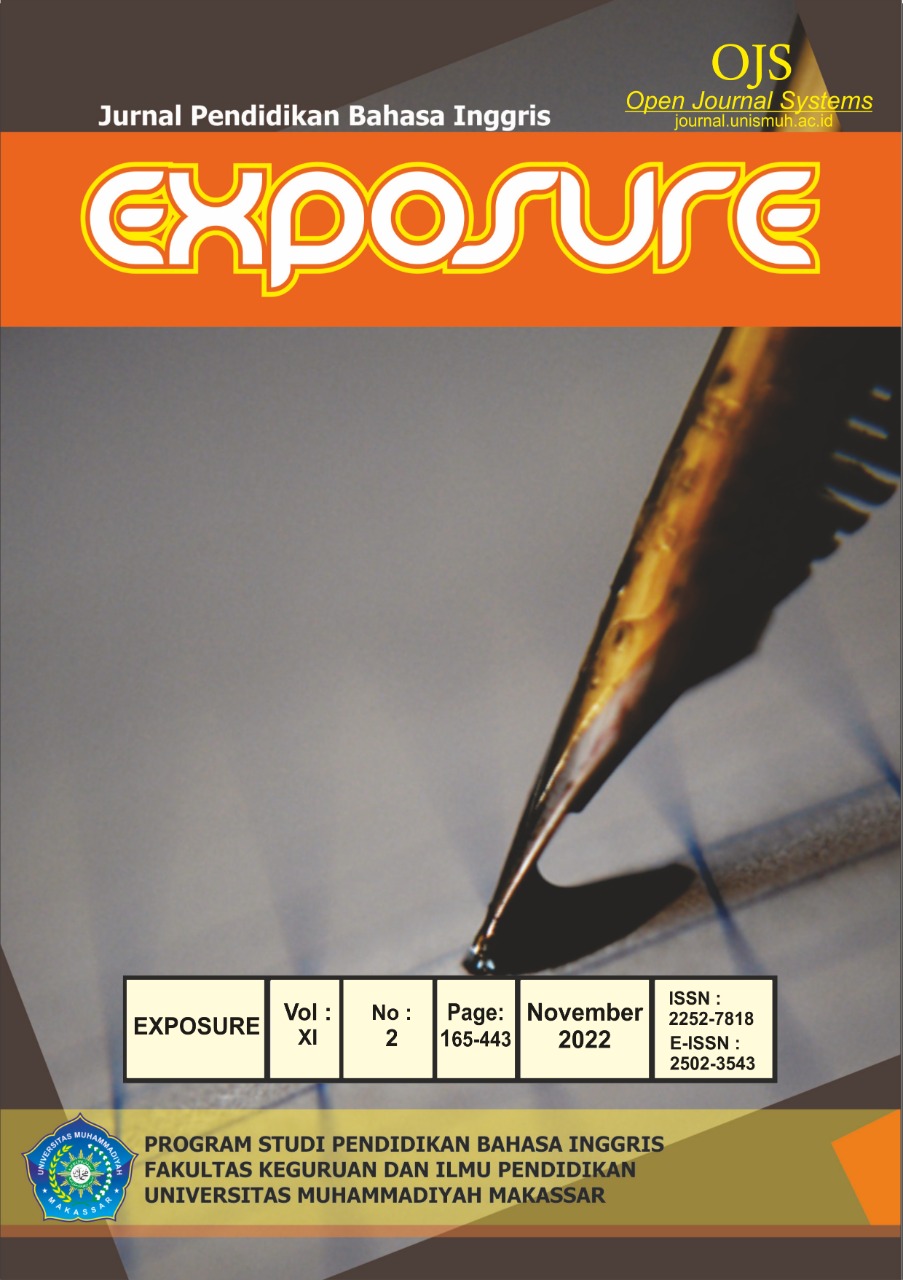THE USE OF AN ONLINE LEARNING SITE ‘RANDALL’S ESL’ IN TEACHING LISTENING
DOI:
https://doi.org/10.26618/exposure.v11i2.9269Kata Kunci:
listening skill, media education, teachingAbstrak
Learning a language, especially English is of the utmost importance because it is not only a widely-spoken tongue but also one that could assist students in their future careers. However, some students in Indonesia continue to believe that learning English is difficult. There are four fundamental abilities they must master. They are engaged in listening, speaking, reading, and writing activities. In this study, the authors intend to demonstrate how Randall's ESL website could be used as one of the options for teachers and students to improve their English listening skills. The authors utilized a qualitative methodology, and the dataset was obtained from the official "Randall's ESL" website. The writers used Alexander Fedorov's Media Education philosophy. The authors also drew data from other sources, such as journal articles and conference proceedings, to support the research. This study revealed that "Randall's ESL" was one of the most successful options for enhancing students' listening skills and teachers' instructional practices.
Referensi
Ariansyah, A. (2021). Why is learning Engslish difficult? Conference Paper.
Brown, H. D., & Lee, H. (2015). Teaching by principles : An interactive approach to language pedagogy. Pearson Education.
Darti, D., & Asmawati, A. (2017). Analyzing students’ difficulties toward listening comprehension. English, Teaching, Learning, and Research Journal, 3(2) 211-228.
https://doi.org/10.24252/Eternal.V32.2017.A9
Fedorov. (2001) Media Education: History, Theory and Methods. Rostov: CVVR, 2001, 708 p.
Field, J. (2008). Teaching listening in the language classroom. In Singapore: SEAMEO Regional Language Centre. Cambridge University Press.
Media Education (1993). In: Russian Pedagogical Encyclopedia. Vol.1. Moscow: Big Russian Encyclopedia., p. 555.
Nishanthi, R. (2018). Important of learning English in today world. International Journal of Trend in Scientific Research and Development, 3(1), 871-874. doi:10.31142/ijtsrd19061.
Purdy, M. (1997). WHAT IS LISTENING? Listening in Everyday Life: A Personal and Professional Approach.
Randall’s ESL Cyber Listening Lab - For English Students. (2019). Esl-Lab.com. https://www.esl-lab.com/
Rintaningrum, R. (2018). lnvestigating Reasons Why Listening in English is Difficult: Voice from Foreign language Learners. Asian EFL Journal, 20(11), 6–15.
https://www.researchgate.net/profile/KhadijahMaming/publication/329625974_The_Asian_EFL_Journal/links/5c12766c299bf13 9c756b1d3/The-Asian-EFL-Journal.pdf.
Rost, M. (2011). Teaching and researching listening: Second edition. Longman.
Sundari, W. (2018). The Difficulties of Learning English for the Basic English Learners. Culturalistics: Journal of Cultural, Literary, and Linguistic Studies,
Unduhan
Diterbitkan
Terbitan
Bagian
Lisensi
Authors who publish with this journal agree to the following terms:
In order to assure the highest standards for published articles, a peer review policy is applied. In pursue of the compliance with academic standards, all parties involved in the publishing process (the authors, the editors and the editorial board and the reviewers) agree to meet the responsibilities stated below in accordance to the Journal publication ethics and malpractice statement.
Duties of Authors:
- The author(s) warrant that the submitted article is an original work, which has not been previously published, and that they have obtained an agreement from any co-author(s) prior to the manuscript’s submission;
- The author(s) should not submit articles describing essentially the same research to more than one journal;
- The authors(s) make certain that the manuscript meets the terms of the Manuscript Submission Guideline regarding appropriate academic citation and that no copyright infringement occurs;
- The authors(s) should inform the editors about any conflict of interests and report any errors they subsequently, discover in their manuscript.
Duties of Editors and the Editorial Board:
- The editors, together with the editorial board, are responsible for deciding upon the publication or rejection of the submitted manuscripts based only on their originality, significance, and relevance to the domains of the journal;
- The editors evaluate the manuscripts compliance with academic criteria, the domains of the journal and the guidelines;
- The editors must at all times respect the confidentiality of any information pertaining to the submitted manuscripts;
- The editors assign the review of each manuscript to two reviewers chosen according to their domains of expertise. The editors must take into account any conflict of interest reported by the authors and the reviewers.
- The editors must ensure that the comments and recommendations of the reviewers are sent to the author(s) in due time and that the manuscripts are returned to the editors, who take the final decision to publish them or not.
Authors are permitted and encouraged to post online a pre-publication manuscript (but not the Publisher’s final formatted PDF version of the Work) in institutional repositories or on their Websites prior to and during the submission process, as it can lead to productive exchanges, as well as earlier and greater citation of published work (see The Effect of Open Access). Any such posting made before acceptance and publication of the Work shall be updated upon publication to include a reference to the Publisher-assigned DOI (Digital Object Identifier) and a link to the online abstract for the final published Work in the Journal.

